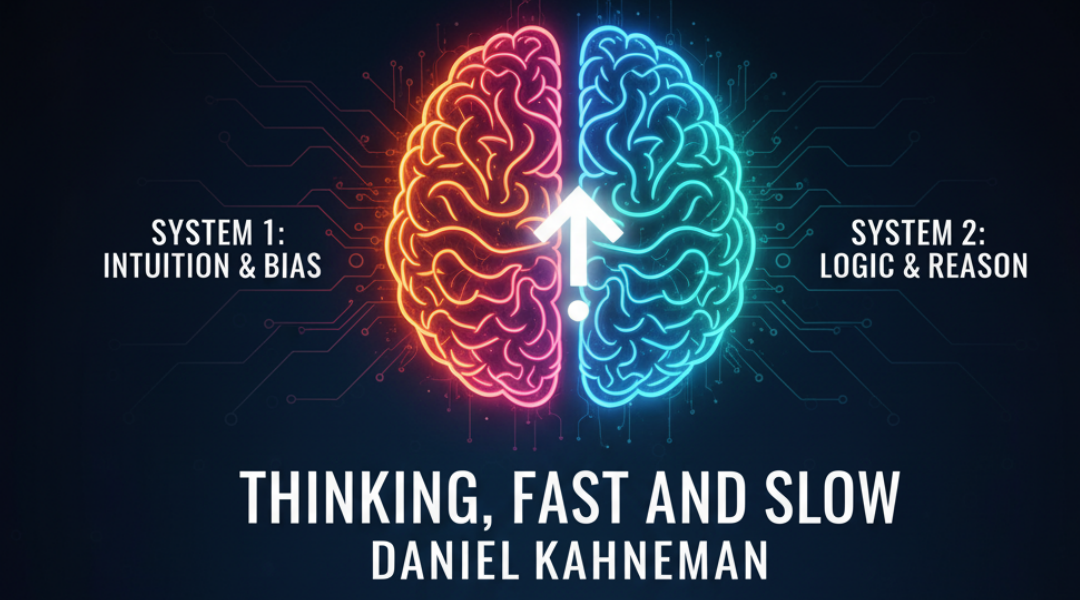
本文专为面临职业、投资等重大决策的中年人解读《思考,快与慢》,文章深入解析了大脑的快(直觉)与慢(理性)两种思维系统,并结合锚定效应、损失厌恶等常见认知偏误,提供了决策检查清单等实用工具,旨在帮助中年读者识别并克服思维陷阱,在人生的关键路口做出更明智、更理性的选择。
卡尼曼《思考快与慢》与决策心理学概念
双系统思维模型解析
Analysis of the Dual-System Thinking Model
丹尼尔·卡尼曼/ˈkɑːnəmən/是2002年诺贝尔经济学奖得主,他在《思考,快与慢》中提出了革命性的双系统思维模型。系统1快速、直觉、情绪化;系统2较慢、需要努力、更具逻辑性。
Daniel Kahneman /ˈkɑːnəmən/ is the 2002 Nobel Prize winner in Economics who proposed a revolutionary dual-system thinking model in "Thinking, Fast and Slow." System 1 is fast, intuitive, and emotional; System 2 is slower, effortful, and more logical.
对于中年管理者而言,理解这两个系统的工作机制至关重要。系统1负责日常的自动化反应,如识别面部表情、判断距离、完成简单计算。系统2则处理复杂推理、统计分析、多步骤计划等需要专注力的任务。
For mid-career managers, understanding how these two systems work is crucial. System 1 handles daily automated responses like recognizing facial expressions, judging distances, and simple calculations. System 2 processes complex reasoning, statistical analysis, and multi-step planning that require focused attention.
认知偏误的识别与应对
Identifying and Addressing Cognitive Biases
书中详细描述了人类思维中存在的各种认知偏误/kɒɡˈnɪtɪv ˈbaɪəs/。锚定效应让我们过度依赖接收到的第一个信息;可得性启发式使我们高估容易回想起的事件发生概率;确认偏误让我们只寻找支持既有观点的证据。
The book details various cognitive biases /kɒɡˈnɪtɪv ˈbaɪəs/ in human thinking. Anchoring effect makes us overly rely on the first information received; availability heuristic causes us to overestimate the probability of easily recalled events; confirmation bias makes us seek only evidence supporting existing views.
对中年职场人士来说,这些偏误在商业决策中尤其危险。投资决策中的损失厌恶、招聘过程中的光环效应、战略规划中的过度自信,都可能导致重大损失。
For mid-career professionals, these biases are especially dangerous in business decisions. Loss aversion in investment decisions, halo effects in hiring processes, and overconfidence in strategic planning can all lead to significant losses.
损失厌恶与前景理论
Loss Aversion and Prospect Theory
卡尼曼的前景理论/ˈprɒspekt ˈθɪəri/揭示了人们在面对收益和损失时的不对称心理。一般来说,损失带来的痛苦大约是等量收益带来快乐的两倍,这就是著名的损失厌恶现象。
Kahneman's prospect theory /ˈprɒspekt ˈθɪəri/ reveals people's asymmetric psychology when facing gains and losses. Generally, the pain from losses is about twice as intense as the pleasure from equivalent gains, known as the famous loss aversion phenomenon.
这一发现对中年投资者具有重要指导意义。理解损失厌恶可以帮助我们制定更理性的投资策略,避免因为害怕损失而过度保守,或因为已经亏损而追加投资的非理性行为。
This discovery has important guiding significance for mid-career investors. Understanding loss aversion can help us formulate more rational investment strategies, avoiding being overly conservative due to fear of losses or irrationally adding investments due to existing losses.
框架效应在决策中的应用
Application of Framing Effects in Decision Making
书中的框架效应/ˈfreɪmɪŋ ɪˈfekt/实验显示,同样的信息以不同方式呈现会导致截然不同的选择。比如,"90%成功率"和"10%失败率"本质相同,但人们对前者的接受度更高。
The framing effect /ˈfreɪmɪŋ ɪˈfekt/ experiments in the book show that the same information presented differently leads to completely different choices. For example, "90% success rate" and "10% failure rate" are essentially the same, but people are more receptive to the former.
中年管理者可以利用框架效应改善沟通效果。在提出建议、汇报工作或说服他人时,选择合适的表达框架能够显著提高接受度。同时也要警惕他人可能使用的框架操纵。
Mid-career managers can use framing effects to improve communication effectiveness. When making suggestions, reporting work, or persuading others, choosing appropriate expression frames can significantly improve acceptance. At the same time, be alert to potential frame manipulation by others.
专家直觉的可信度分析
Reliability Analysis of Expert Intuition
卡尼曼对专家直觉/ɪkˈspɜːrt ɪnˈtuːɪʃən/进行了深入研究,发现只有在规律性强、反馈及时的环境中,直觉才可靠。例如,象棋大师在熟悉局面下的直觉判断准确度很高,但股票分析师的预测往往不比随机选择好。
Kahneman conducted in-depth research on expert intuition /ɪkˈspɜːrt ɪnˈtuːɪʃən/, finding that intuition is reliable only in environments with strong regularity and timely feedback. For example, chess masters' intuitive judgments are highly accurate in familiar positions, but stock analysts' predictions are often no better than random selection.
这对中年专业人士具有重要启示:在自己的专业领域内,经验丰富的专家直觉是有价值的;但在复杂多变的商业环境中,过度依赖直觉可能导致错误决策。需要结合系统2的理性分析。
This has important implications for mid-career professionals: within one's area of expertise, experienced expert intuition is valuable; but in complex and changing business environments, over-relying on intuition may lead to wrong decisions. It's necessary to combine rational analysis from System 2.
实际应用的决策改进框架
Practical Decision Improvement Framework
基于书中理论,中年决策者可以建立一套系统性的决策改进框架:首先识别决策类型,判断是否适合快速直觉判断;其次检查可能存在的认知偏误;最后设计决策流程,确保重要决策经过充分的系统2思考。
Based on the theories in the book, mid-career decision makers can establish a systematic decision improvement framework: first identify decision types and judge whether quick intuitive judgment is appropriate; second check for possible cognitive biases; finally design decision processes ensuring important decisions undergo sufficient System 2 thinking.
在团队决策中,可以引入"恶魔代言人"机制,专门寻找方案的问题和风险;建立决策记录制度,定期回顾决策过程和结果,从中学习改进。
In team decisions, introduce a "devil's advocate" mechanism specifically to find problems and risks in proposals; establish decision recording systems, regularly review decision processes and outcomes to learn and improve.
FAQ常见问题
1. 如何在日常工作中应用双系统理论?
How to apply dual-system theory in daily work?
重要决策时刻意启动系统2,通过列清单、多角度分析等方法强迫自己慢思考,避免匆忙的直觉判断。
Deliberately activate System 2 for important decisions, force yourself to think slowly through methods like making lists and multi-angle analysis, avoiding hasty intuitive judgments.
2. 如何判断什么时候可以相信直觉?
How to judge when to trust intuition?
在自己专业领域、有规律可循、反馈及时的情况下,直觉相对可靠。在复杂多变、缺乏经验的情况下需要谨慎。
Intuition is relatively reliable in one's professional field with regular patterns and timely feedback. Be cautious in complex, changing situations lacking experience.
3. 损失厌恶如何影响投资决策?
How does loss aversion affect investment decisions?
可能导致过度保守或追加亏损投资。建议设定明确的投资规则,用系统性方法而非情绪来指导决策。
May lead to excessive conservatism or adding to losing investments. Recommend setting clear investment rules and using systematic methods rather than emotions to guide decisions.
4. 框架效应在管理中如何运用?
How to use framing effects in management?
同样信息用积极框架表达更容易被接受。如强调成功概率而非失败风险,关注已取得成就而非未完成任务。
The same information is more easily accepted when expressed in positive frames. Such as emphasizing success probability rather than failure risk, focusing on achievements rather than incomplete tasks.
5. 如何减少团队决策中的认知偏误?
How to reduce cognitive biases in team decisions?
建立结构化决策流程,引入外部视角,鼓励不同意见,定期回顾决策质量而非仅看结果。
Establish structured decision processes, introduce external perspectives, encourage different opinions, regularly review decision quality not just outcomes.
6. 这本书适合什么层次的管理者?
What level of managers is this book suitable for?
适合所有需要做决策的管理者,特别是中高层管理者。书中理论实用性强,有助于提升决策质量。
Suitable for all managers who need to make decisions, especially mid to senior level managers. The theories in the book are highly practical and help improve decision quality.
关键词
- 中文:思考快与慢、双系统思维、认知偏误、损失厌恶、框架效应、专家直觉
- English: Thinking Fast and Slow, dual-system thinking, cognitive bias, loss aversion, framing effect, expert intuition

